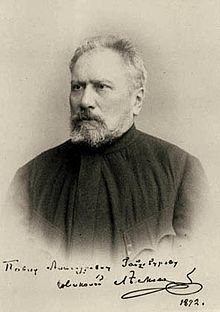Time according to God's will
The time according to God's will ( Russian Час воли божией , Tschas woli boschijei ) is a fairy tale by the Russian writer Nikolai Leskow , which appeared in the November issue of the Saint Petersburg magazine Russkoje obosrenije ( Russian Rundschau ) in 1890 .
Emergence
At the end of the 1880s, Tolstoy asked his friend Leskov for a fairy tale in which the questions asked below, which torment the ruler of the empire, are correctly answered by a clever, simple girl from the people. Leskov wrote the fairy tale, but Tolstoy didn't like the finished story - perhaps because the king and boyars are portrayed as ridiculous characters. The able hide among the people.
content
King Dobrochot avoids wars, rules otherwise wisely, but wants his boyars to answer the question: "Why are we hungry and cold, and why does one start flourishing and the other not?" The boyars ponder and divide turn into two parties. Some want the good old days back and others want to wait, that is, wait for the better future. King Dobrochot cannot do anything with the foolish talk of the boyars, but his old foreign nurse knows what to do. The woman thinks that three pious hermits, the ancient brothers Dubowik, Polewik and Wodowik, certainly know why the king will not succeed. Sent royal messengers bring the three from forest, field and moor. Unfortunately, the ancients are silent because they have lost the language, each centuries old. Before King Dobrochot can call his boyars for help, the foreign nurse persuades him a second time. The ruler again follows their advice; calls his court jester, the Gusli player Rasljuljai. The juggler and idler succeeds in the feat. The three silent men open their mouths. When asked by the king why the good neither flourishes nor succeeds, Dubowik replies: “Because people do not know which time is most significant.” Polewik adds: “Because they do not know which person is most needed.” And Vodowik adds: “Because they do not know which deed is most valuable.” Since the hermits spoke in riddles and then immediately sank back into their silence, the king arrested them in his palace. The three old men manage to escape into the open, never to be seen again. When the boyars cannot help, the foreign nurse, who had just had a prophetic dream about this, jumps into the breach for the third time. Only a pure, selfless virgin could answer. Again the gusli player Rasljuljai is sent out. The day thief seeks and finds the riddle-solving, young, lovely girl behind dark fir trees in a clearing. In his simplicity, the beautiful child perfects the three answers of the otherwise silent hermit: The most significant time is the present. Most needed is the person you are dealing with. And the good you do to this person is the most valuable deed. King Dobrochot can do something with that.
The end of the story: The royal deed does not follow the girl's recognized words. Everything stays the same. The time according to God's will is still a long way off.
German-language editions
Output used:
- Time according to God's will. A fairy tale. German by Wilhelm Plackmeyer. P. 5–33 in Eberhard Reissner (Ed.): Nikolai Leskow: Collected works in individual volumes. The valley of tears. 587 pages. Rütten & Loening, Berlin 1973 (1st edition)
Web links
- The text
- Entry in the Laboratory of Fantastics (Russian)
- Entry in WorldCat
